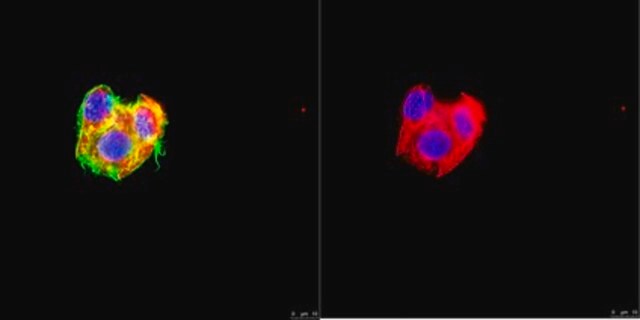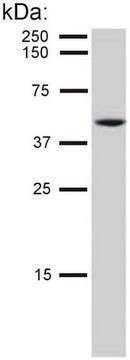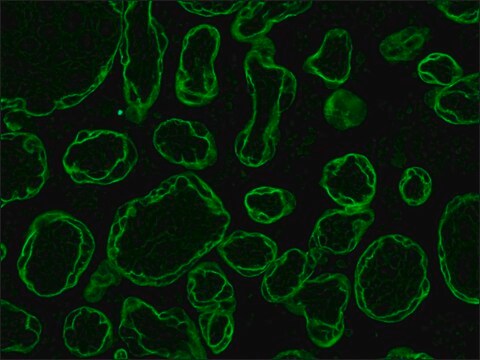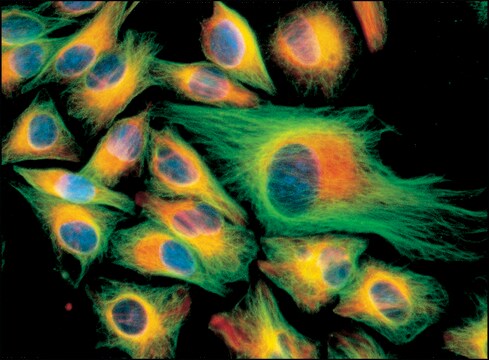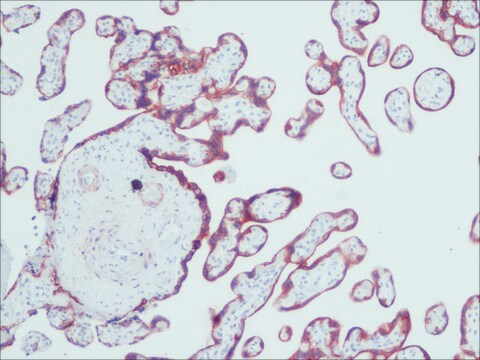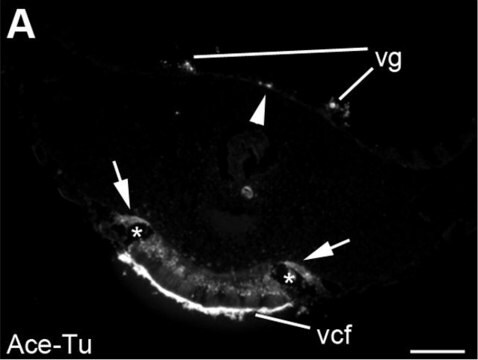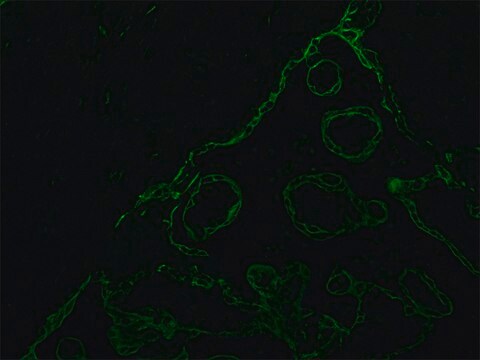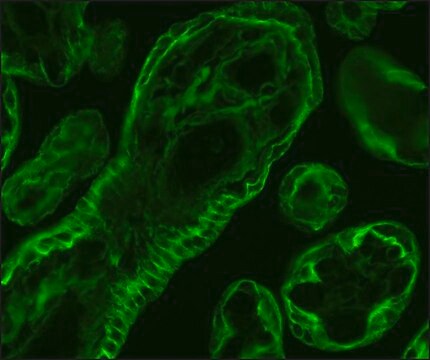推荐产品
生物源
mouse
品質等級
共軛
unconjugated
抗體表格
ascites fluid
抗體產品種類
primary antibodies
無性繁殖
M20, monoclonal
分子量
antigen 52 kDa
包含
15 mM sodium azide
物種活性
feline, human, rabbit, canine, bovine
技術
immunohistochemistry (frozen sections): suitable
indirect immunofluorescence: 1:200 using frozen sections of human or animal tissue
western blot: suitable
同型
IgG1
UniProt登錄號
運輸包裝
dry ice
儲存溫度
−20°C
目標翻譯後修改
unmodified
基因資訊
human ... KRT8(3856)
一般說明
Cytokeratin is a 52.5kD cytoplasmic structural protein that belongs to type II, neutral-to-basic subfamily. It consists of 29 different proteins which is the characteristic of epithelial and trichocytic cells. Monoclonal anti-cytokeratin peptide 8 antibody can be used as a marker for epithelial cell differentiation as well as a tool for tumor identification and classification. It can also be used in western blotting. Mouse anti-cytokeratin peptide 8 antibody reacts specifically with various human simple and complex epithelia like- liver, intestine, pancreas, urinary bladder, salivary gland, thyroid, prostate, mesothel, and placenta but not with stratified squamous epithelia. The product also does not react with non-epithelial tissues (exceptions-certain smooth muscle cells). This product has also shown cross reactivity for cytokeratin of rabbit, cow, dog, and cat.Monoclonal Anti-Cytokeratin 8 (mouse IgG1 isotype) is derived from the M20 hybridoma produced by the fusion of mouse myeloma cells and splenocytes from BALB/c mice immunized with a cytokeratin preparation purified from the human breast carcinoma cell line MCF7.
特異性
Mouse anti-cytokeratin peptide 8 antibody reacts specifically with various human simple and complex epithelia like- liver, intestine, pancreas, urinary bladder, salivary gland, thyroid, prostate, mesothel, and placenta but not with stratified squamous epithelia. The product also does not react with non-epithelial tissues (exceptions-certain smooth muscle cells). This product has also shown cross reactivity for cytokeratin of rabbit, cow, dog, and cat.
免疫原
cytokeratin from human breast carcinoma cell line MCF7.
應用
Monoclonal anti-cytokeratin peptide 8 antibody has been used in
- immunofluorescence microscopy
- immunohistochemistry
- dot blotting
- protein preparation from bovine epithelial cells
- immunofluorescence
- western blotting
生化/生理作用
Monoclonal anti-cytokeratin peptide 8 antibody can be used as a marker for epithelial cell differentiation as well as a tool for tumor identification and classification. It can also be used in western blotting.
免責聲明
Unless otherwise stated in our catalog or other company documentation accompanying the product(s), our products are intended for research use only and are not to be used for any other purpose, which includes but is not limited to, unauthorized commercial uses, in vitro diagnostic uses, ex vivo or in vivo therapeutic uses or any type of consumption or application to humans or animals.
未找到合适的产品?
试试我们的产品选型工具.
儲存類別代碼
10 - Combustible liquids
閃點(°F)
Not applicable
閃點(°C)
Not applicable
Myoglobin: a promising exogenous reference marker using in proteomics analysis
Wang T, et al.
Food Science and Biotechnology, 22, 393-398 (2013)
David Soler et al.
Genes, chromosomes & cancer, 44(4), 339-350 (2005-07-30)
The development of genomic instability is an important step toward generating the multiple genetic changes required for cancer. Telomere dysfunction is one of the factors that contribute to tumorigenesis. Telomeres shorten with each cell division in the absence of telomerase.
G N Van Muijen et al.
Laboratory investigation; a journal of technical methods and pathology, 57(4), 359-369 (1987-10-01)
Tissues from human fetuses (12 to 14 weeks) were studied by using immunohistochemical methods, with special emphasis on coexpression of intermediate filaments. Well-characterized antibodies, monoclonal as well as polyclonal were used. Indirect immunoperoxidase staining disclosed simultaneous expression of cytokeratin and
S Portet et al.
Cytometry, 35(3), 203-213 (1999-03-19)
In the MCF7 human breast cancer cell line, several patterns of cytokeratin networks are observed, depending on the intracellular localization. Our hypothesis is that architectural variations of cytokeratin networks depend on local tensions or forces appearing spontaneously in the cytoplasm.
Mingxi Hua et al.
Journal of cell science, 125(Pt 23), 5800-5810 (2012-09-15)
The correct functioning of hepatocytes requires the establishment and maintenance of hepatocyte polarity. However, the mechanisms regulating the generation of hepatocyte polarity are not completely understood. The differentiation of human fetal hepatic progenitor cells (hFHPCs) into functional hepatocytes provides a
我们的科学家团队拥有各种研究领域经验,包括生命科学、材料科学、化学合成、色谱、分析及许多其他领域.
联系技术服务部门